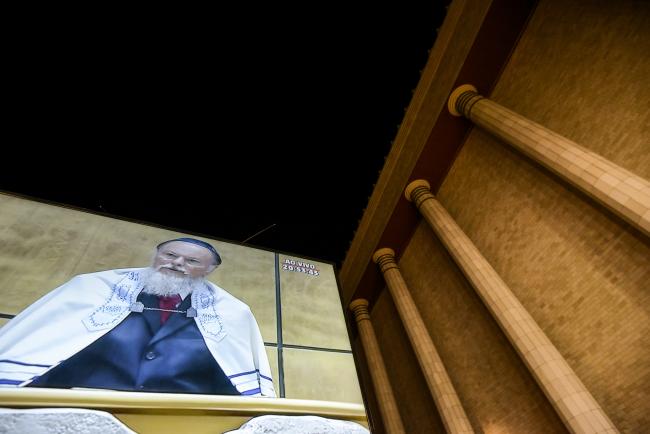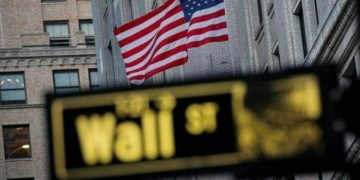 © Bloomberg. Edir Macedo is projected on a screen displayed outside a replica of Solomon’s Temple during its inauguration ceremony in Sao Paulo, Brazil, on Thursday, July 31, 2014.
© Bloomberg. Edir Macedo is projected on a screen displayed outside a replica of Solomon’s Temple during its inauguration ceremony in Sao Paulo, Brazil, on Thursday, July 31, 2014. (Bloomberg) — Ahead of Brazil’s wildly unpredictable elections, one of the wealthiest and most powerful men in the country is expanding yet further the frontiers of his media and religious empire.
“Nothing to Lose,” the rags-to-riches biopic of billionaire evangelical bishop Edir Macedo, debuted on Netflix (NASDAQ:) Friday just months after its cinema release drew millions of Brazilians to the Universal Church’s latest marketing tool. It was the most successful film in the history of Brazilian cinema, according to TV Record, the television station controlled by Macedo.
Whether or not that’s actually true — other local media disputed the claim — its opening night in Brasilia on March 28 attracted many of the country’s political elite, including federal deputies, governors and even the president of congress. With its TV channels, radio stations and pulpits, Macedo’s Universal Church already plays a major role in shaping public opinion, and as Brazil’s political uncertainties grow, the organization’s discipline and deep pockets looks set to have a significant impact on this year’s elections. Hopes are high that the evangelical caucus in Congress will double in size after October’s vote.
Universal Church is not “allied to any political candidate” its press department said by email. Record declined to comment for this story.
“The programming, whether it’s entertainment, news or even religious, are all orchestrated around defending the group’s political and economic interests,” says Janaine Aires, a researcher who published a book detailing the relationship between religion, media and politics in Brazil.
Macedo controls a total of five media outlets, but none is more powerful than the television channel he was nearly barred from purchasing, Record TV, often considered Brazil’s second largest network. This puts Macedo in a uniquely powerful position as a pool of largely unpopular presidential candidates scramble for media attention.
“Look at the state of Sao Paulo. You have 645 municipalities. How is a person going to get to know 645 municipalities?” presidential hopeful Geraldo Alckmin asked a group of business leaders in Rio de Janeiro last week. “You have to be on television.”
Faced with single digit vote intentions, Alckmin has been working overtime to rally support. In an effort to gain favor with Macedo, Alckmin reportedly planned to meet with the bishop’s nephew Marcelo Crivella, another evangelical bishop who demonstrated the church’s political strength with his election as mayor of Rio de Janeiro in 2016. An adviser to Alckmin told Bloomberg that the candidate did not meet Crivella, but he did sit down with Marcos Pereira, president of the Brazilian Republican Party, or PRB, the party most closely allied with Macedo.
At least one presidential hopeful has already received some coverage on Record. Billionaire retailer Flavio Rocha, also of the PRB, was recently interviewed on The Love School, a show hosted by Macedo’s daughter.
No Alliances
Traditionally, candidates and parties have stitched together all kinds of tenuous coalitions in an effort to grab a greater slice of the official pre-election broadcast time that’s allocated according to previous results. They’ve also worked hard to charm the media companies whose news and entertainment programs determine the electorate’s perception of political candidates. This year, with state-mandated TV time considerably reduced, the role of the media channels linked to Macedo’s Universal Church could be considerably enhanced.
At least one presidential hopeful has already received some coverage on Record. Billionaire retailer Flavio Rocha, who is running for the Brazilian Republican Party, or PRB, the party most closely allied with Macedo, was recently interviewed on The Love School, a show hosted by Macedo’s daughter.
Rocha also invested in “Nothing to Lose.” An adviser said Rocha sponsored a number of cultural projects and the film was just one of them.
In his book A Power Plan, Macedo outlined his ambitions to see the evangelical church run the country one day. With the count of evangelicals growing by over 60 percent between 2000 and 2010, according to public census, the numbers appear to be going his way. A 2017 Datafolha poll found that more than 30 percent of Brazilians consider themselves evangelical. Should the trend continue Catholics are likely to lose their majority after about five centuries of dominance.
It is untrue that the Universal Church has any power project, it said by email. “Our only project is to spread the Christian faith and to help the needy.” The church regularly dubs critical reports of its activity as “fake news”.
The changing numbers have translated into considerable political power. Brazil’s Evangelical congressional bloc is currently estimated to include about 70 congressmen, according to local newspaper Valor Economico.
However, Macedo and evangelical groups are not the only ones blurring the lines between media and politics. Dozens of lawmakers own media outlets such as radio and TV affiliates, a fact that’s unconstitutional, according to Olivia Bandeira, a researcher at communications watchdog Intervozes.
Evangelical discipline
Brazilians’ embrace of social media, as well as changes to campaign financing rules and new measures restricting the use of cinematic propaganda may, however, actually reduce the role television networks such as Record or the nation’s largest network, TV Globo, are used to playing in elections, says Roberto Romano, professor of politics at Unicamp university.
While Record’s coverage of the election could influence voters, local election authorities will be on the lookout for misconduct says Romano. This means that evangelicals are more likely to direct outcomes through more traditional means.
“Evangelicals follow what the pastors say very closely,” says Romano. “They are much more disciplined than Catholics.”
(Updates with details of Alckmin’s meeting in eighth paragraph.)
Source: Investing.com





























